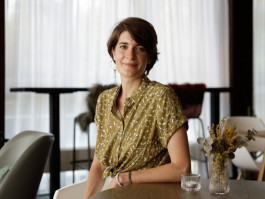ANN VAN WETTEREN
16.10.2020

© Romain Gamba / Maison Moderne
In the hospitality market, the rise in guests’ attention to environmental issues was picked up by the so-called first movers a few years ago: One Hotel in the U.S., Conscious Hotel in Amsterdam, Molia in Spain – they all embrace a sustainable, circular approach to create a genuinely positive impact for both people and planet. Indeed, ecological awareness is translated into stylish “eco-sexy“ design without compromising comfort. Food & Beverages businesses (mostly shortened as F&B) prioritize local and seasonal ingredients, embracing a close relationship with local suppliers and community. Staff members and guests are encouraged to learn about and engage in environmentally friendly practices.
In these hotels, sustainability is not only part of the business model – it is a purpose and a core value of the brand.It acts as sense maker and sense giver to the company.
Having worked in hospitality myself, I am more and more often asked which hotel brands will survive or even thrive through the global pandemic. Impulsively answered, those companies who did their homework the last years. Meaning those that have invested in building a strong brand with a community of guests and staff relying on their values and image.
Forward looking, or viewed sustainably, I’d say those who perceive true hospitality as a people-business embedded in a genuine and healthy surrounding. Ultimately, those daring to take into account the whole ecosystem in which they operate in order to have a positive impact on the environment they work in and on the people they work with.
People love purpose-driven brands. According to a publication by the Cambridge Institute for Sustainability Leadership, 55% of the workforce would choose to work for a socially responsible company, even if they made less money – that number jumps to 76% for millennials. Furthermore, 70 to 83% of millennials would be more loyal to a company that helps them contribute to social and environmental issues. These statistics make it clear that sustainability – and a company’s commitment to it – is top of mind for employees.
Employees are brand ambassadors. When defining New Standards, new habits, and new goals, it is crucial to let them be part of the process. It builds teams who are passionate about the new projects, willing to make a change. Teams build a business – culture builds a team.
To be fair, we all know sustainability is a complex subject. Where to start? How to be consistent? Plus, as of now, there is no single, universal set of criteria for officially recognizing properties as “„sustainable”. Hotels looking to be officially recognized as eco-friendly properties can consider one of the many Global Sustainable Tourism Council-accredited (GSTC) certification bodies around the world.
From my experience trying to incorporate sustainability as a company brand standard, 2020 is a great opportunity to pivot.
Still, start small, keep it simple, and be consistent. Don’t try to be everything to everyone. Find something you really care about, that everyone understands, and stay true, be it:
Cutting down on food waste
Eliminating plastic
Conserving energy
Creating a paperless hotel
Integrating sustainability into the design
Setting up social programs
Etc.
Be sure you’re recognized for your efforts not only with certification. The path to sustainability is a continual, step-by-step process and we know there is always room for improvement in our sustainability efforts. Be strict about your commitments and respect the pace you and your team require.
We at NEW STANDARD.S embrace curiosity and learning. With a hands-on attitude, we’ll guide you and your team through the overload of information. We explore your ideas, solutions, and strategies for developing future-oriented strategies and managing operations in a sustainable way. We do this in an authentic, cost-effective, fun, simple, and empowering way.
All this to be sure that every element of your brand habits reflects your vision for a better future.
Finally, both the economic and ecological benefits of a sustainable business are crucial, and the time has finally come to start the process of implementing sustainable accommodation that even Greta would be happy to call home.
Expert Opinion by
ANN VAN WETTEREN
As a trained anthropologist, Ann is a true people-person. Having worked as a concept and project developer at the 25h hotel, she knows the challenges facing the hospitality industry – from Copenhagen to Sydney. Her industry knowledge and out-of-the-box thinking surprise and inspire people, especially when it comes to finding and establishing sustainable solutions. Through her work as a clinic clown trainer, Ann knows how to make people feel at ease, which is what makes her an approachable facilitator. Using design thinking, she guides teams through change processes and makes the experience memorable and entertaining, too.
NEW LETTER.S
Want to learn more about how we’re setting new standards in this world? Subscribe to our newsletter to get practical tips and fun insights into sustainable change.
NEW LETTER.S
Want to learn more about how we’re setting new standards in this world? Subscribe to our newsletter to get practical tips and fun insights into sustainable change.